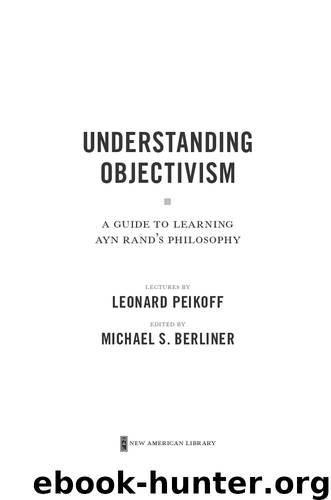Understanding Objectivism by Michael S. Berliner

Author:Michael S. Berliner [Berliner, Michael S.]
Language: eng
Format: epub
ISBN: 9781101577332
Publisher: Penguin Group US
Published: 2012-03-05T16:00:00+00:00
We could go on indefinitely, but that’s just by way of trying to chew this idea for you. Our consciousness as a complex, detailed identity is conceptual, volitional, contextual, purposeful, emotional, and all of this will be reflected in our knowledge; all of this will have effects. First of all, on how to acquire knowledge, on the right procedures; and second of all, on the form in which knowledge is held in our minds, because the form in which we hold it is dictated by the method by which we acquired it. If you acquire knowledge by logic, integration, you’re going to hold it in the form that is logically related, concretized, defined, and so on. This course is intended to help you hold philosophical ideas chewed rather than floating.
We can summarize. In one sense, all of cognition reflects only our consciousness. Intrinsicism, if you think about it, is simply nonsense. Knowledge is fantastically “creative”—it’s all created by our minds. But immediately, the other shoe has to drop—our consciousness is the faculty for grasping reality, so our knowledge is not subjective. Every facet of our consciousness injects an element into knowledge, but it’s still knowledge of reality. That’s the essence of the objective viewpoint.
What then is the basic validation of the concept of the “objective”? It comes down to two axioms. One, consciousness is the faculty of perceiving existence (that’s as against subjectivism), and two, consciousness has identity (that’s as against intrinsicism); and that one, by the way, is just the union of “A is A” and “consciousness.” There is no further validation of objectivity; it’s simply a corollary of these two, and they are both axioms. But it’s so abstract at that stage that it doesn’t mean anything. You first have to chew in detail what the contributions of consciousness are to knowledge—senses, concepts, and so on—and then only at the end can we give some content to the idea of why it’s the objective versus the intrinsic. That’s why on the hierarchy sheet I put it at the end of epistemology, rather than the beginning.
So what is the context for understanding objectivity? You have to know all of metaphysics and epistemology. But if we restrict it down to the bare essence, it comes down to: “Existence is there independent of us (the primacy of existence), and we only grasp it by a certain kind of conceptual process.” Once we know all that, we just draw the general conclusion, “Therefore, we grasp reality somehow.”
There are three basic viewpoints on this question of consciousness in relation to existence. You could take the view of consciousness turned in on itself, ignoring existence—that is subjectivism, and it leads to skepticism in epistemology, the idea that you can’t know anything. The other side—there is consciousness effacing itself, considering itself as nothing but a passive gazer with no nature—that is intrinsicism, and that’s the base of mysticism. And then there is consciousness as the grasper or perceiver, with a complex identity, and therefore a special method; and that is Objectivism, and that’s the base of reason.
Download
This site does not store any files on its server. We only index and link to content provided by other sites. Please contact the content providers to delete copyright contents if any and email us, we'll remove relevant links or contents immediately.
| Anarchism | Communism & Socialism |
| Conservatism & Liberalism | Democracy |
| Fascism | Libertarianism |
| Nationalism | Radicalism |
| Utopian |
The Secret History by Donna Tartt(19090)
The Social Justice Warrior Handbook by Lisa De Pasquale(12190)
Thirteen Reasons Why by Jay Asher(8912)
This Is How You Lose Her by Junot Diaz(6887)
Weapons of Math Destruction by Cathy O'Neil(6281)
Zero to One by Peter Thiel(5802)
Beartown by Fredrik Backman(5755)
The Myth of the Strong Leader by Archie Brown(5508)
The Fire Next Time by James Baldwin(5446)
How Democracies Die by Steven Levitsky & Daniel Ziblatt(5219)
Promise Me, Dad by Joe Biden(5154)
Stone's Rules by Roger Stone(5088)
A Higher Loyalty: Truth, Lies, and Leadership by James Comey(4964)
100 Deadly Skills by Clint Emerson(4926)
Rise and Kill First by Ronen Bergman(4789)
Secrecy World by Jake Bernstein(4753)
The David Icke Guide to the Global Conspiracy (and how to end it) by David Icke(4720)
The Farm by Tom Rob Smith(4514)
The Doomsday Machine by Daniel Ellsberg(4490)
